Items
Purpose
To Add / Edit / Delete Items of Inventory
Procedure
General Settings
Common Settings
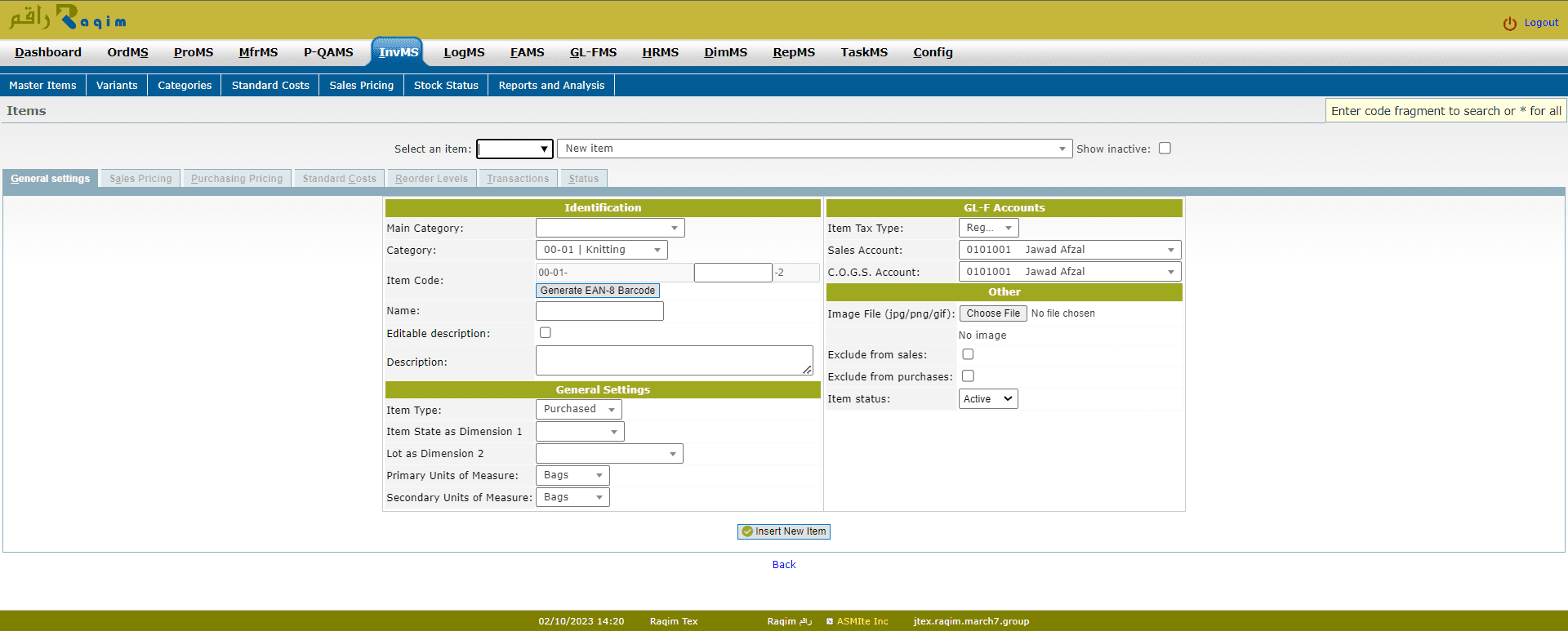
- Identification
Main category: Select the Main Category to which the Item belongs. You can create your own Item Categories which define relevant tax types, ledger accounts and units of measure for the item. You should mark the items/producs as SERVICE when there is no inventory needed when using (selling) the items.
Category: Select the sub-category/general-category to which the item belongs
Item Code: Set the code of the item, Item Code is a non-changeable unique identifier of an item.
Generate EAN-8 Barcode: Use this button to generate the barcode of the item.
Name: Enter the Name of the Item
Editable Description: Check the Editable Description box to make the item have editable description otherwise the item will have default set Name
Description: Enter the description of the item. It is the detailed information of the item.
- General Setting
Item Type: Select the Item Type. It describes the nature of the item, whether it is manufactured, purchased or service.
Item State as Dimmension 1: Select the item state of the item. It describes the state of nature of the item, whether it is an urgent product, Routine, Repeated, Most Urgent or on Request only
Lot as Dimension 2: Select lot of the item. It describes nature of lot of the item, whether it is from Summer Collection Women, Winter collection women, Summer Collection Men or Winter Collection Men.
Primary units of Measure: Select the Primary units of measure of the item. It describes the basic measurement of the item.
Secondary units of Measure: Select the Secondary units of measure of the item. it describes the secondary Measurement of the item.
- Gl-F Accounts
Item Tax Type: The Item Tax Setup is rather counter-intuitive. Retained as such for backward compatibility. To have GST calculated on Item sold to Customer, the same non-zero GST rate have to be set for both:
=> Item Tax Group the item belongs to - untick the related tax type checkbox
=> Tax Group assigned to your customer branch - leave the tax type checkbox ticked
Example:
=> GST rate 5%.
=> Base Invoice price $100.
=> If Sales Type price list has Tax included checkbox ticked, final item price is: $100 = $95.24 + 5% GST.
=> Otherwise tax is added to the price, so final price is: $105 = $100 + 5% GST.Sales Account: Net value of the sales will be booked to this account when registering a sales invoice.
Inventory Account: Net value of goods delivered will be booked to this account when entering a Delivery document.
C.O.G.S Account: Cost of Goods Sold Account. Also used for booking net value of services when entering a purchase invoice.
Inventory Adjustment Account: Used for Stock Movements and Adjustments.
- Other
- Image File: Picture of the Item
- Exclude from Sales: If set, item will not appear on the list when entering a sales order or sales invoice.
- Exclude from Purchases: If set, item will not appear on the list when entering a purchase order or purchase invoice.
- Item Status: It describes the active status of the item. select from the drop-down list, whether the item is active or not.
01 | Yarn
It is the Main Category of Yarn. It provides all the details of the items relating to Yarn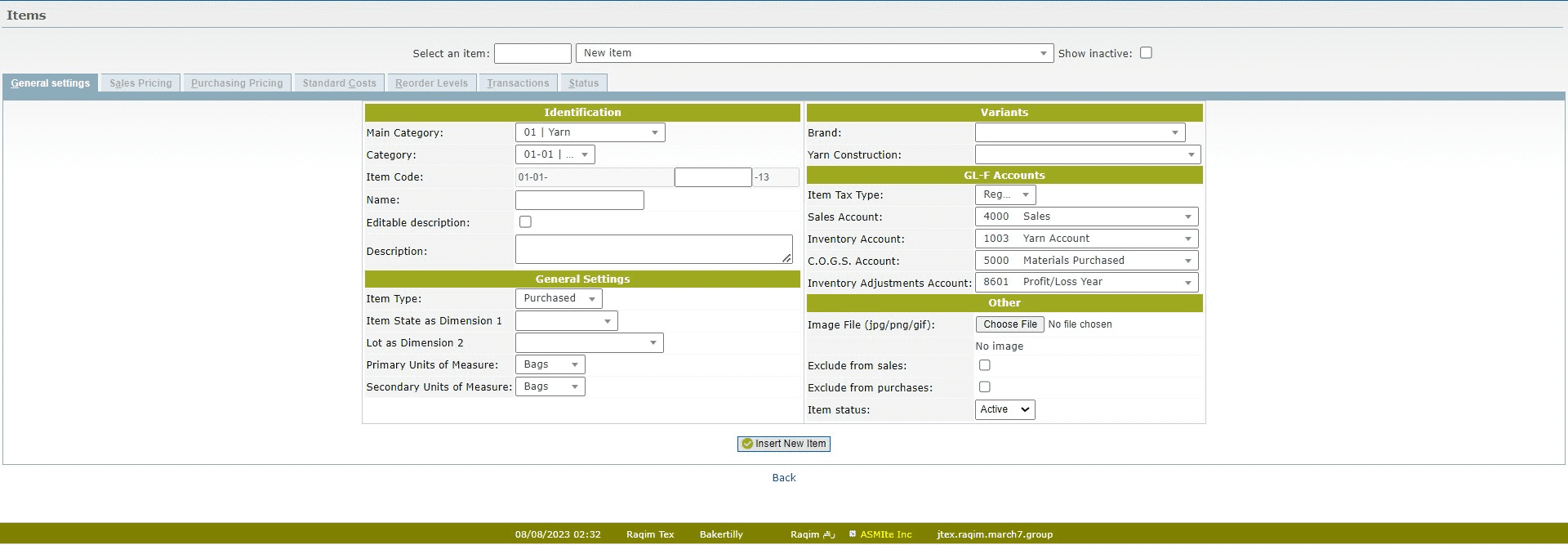
Exclusive Settings of Yarn
- Variants
Brand: Select the brand of the yarn, if defined
Yarn Construction: It is the construction/composition of the yarn.
02 | Dyed Yarn
It is the Main Category of Dyed Yarn.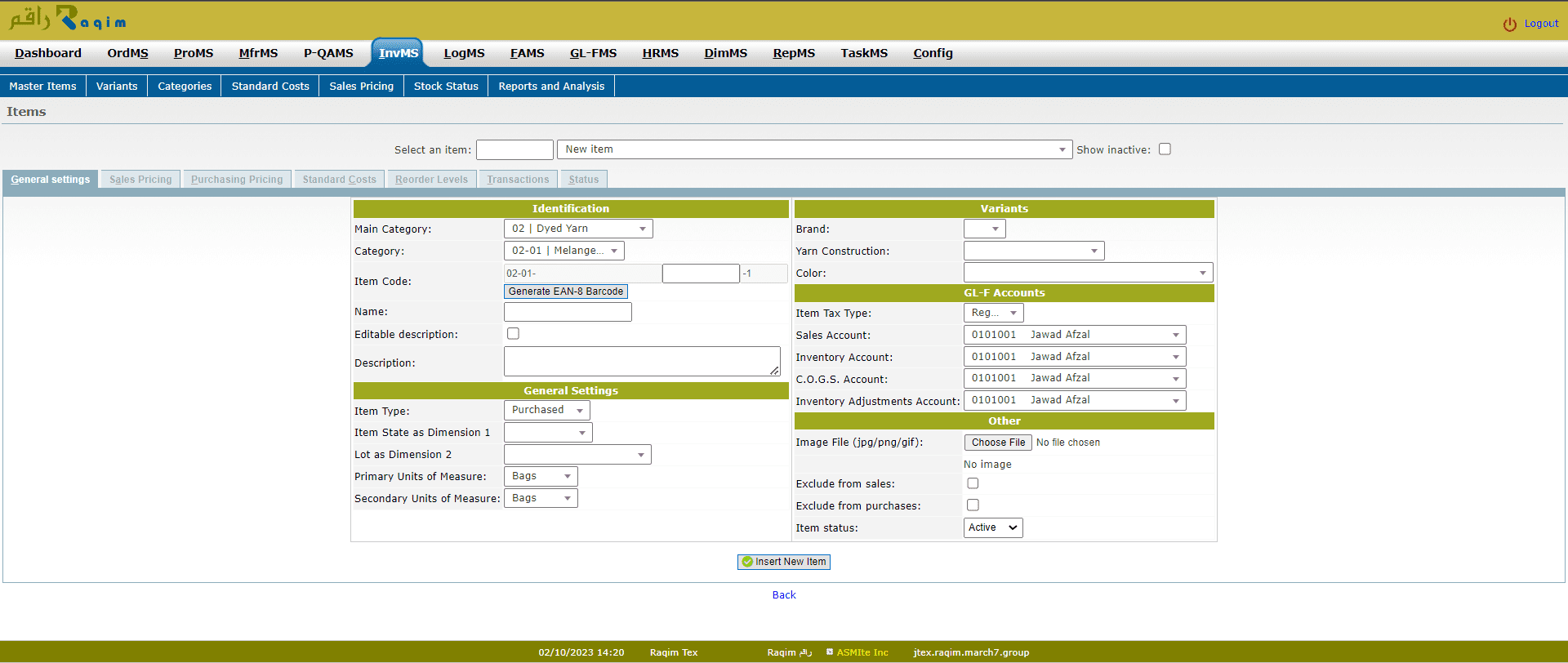
Exclusive Settings of Dyed Yarn
- Variants
Brand: Select the brand of the Dyed Yarn, if Defined
Yarn Construction: It is the construction/composition of the Dyed Yarn
Color: Select the color of the Dyed Yarn
03 | Greige Fabric
It is the Main Category of Greige Fabric.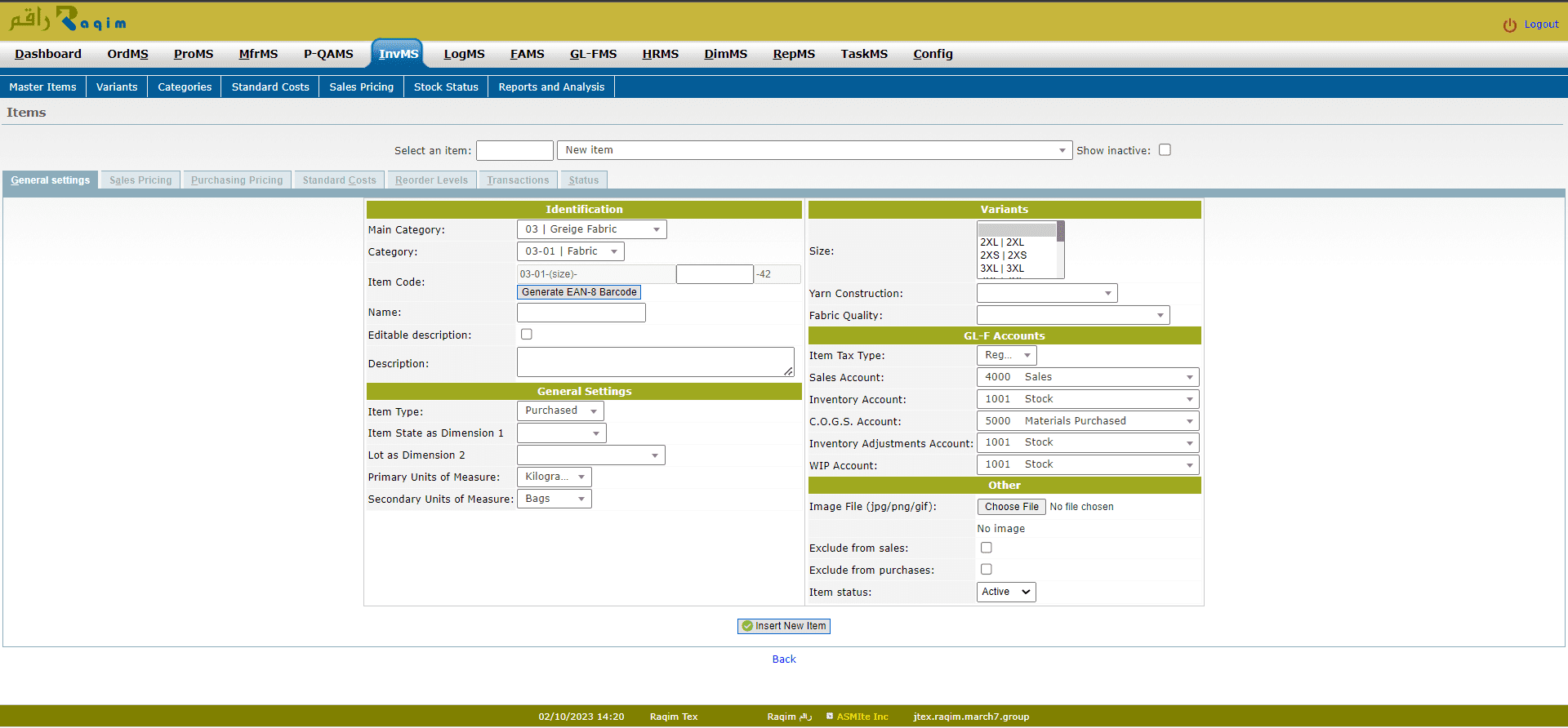
Exclusive Settings of Greige Fabric
- Variants
Size: It is the Size of the fabric
Yarn Construction: It is the Construction mixture of the Yarn Associated to the respective Greige Fabric.
Fabric Quality: It is the quality of the Fabric i.e. GSM ratio.
04 | Dyed Fabric
It is the Main Category of Dyed Fabric.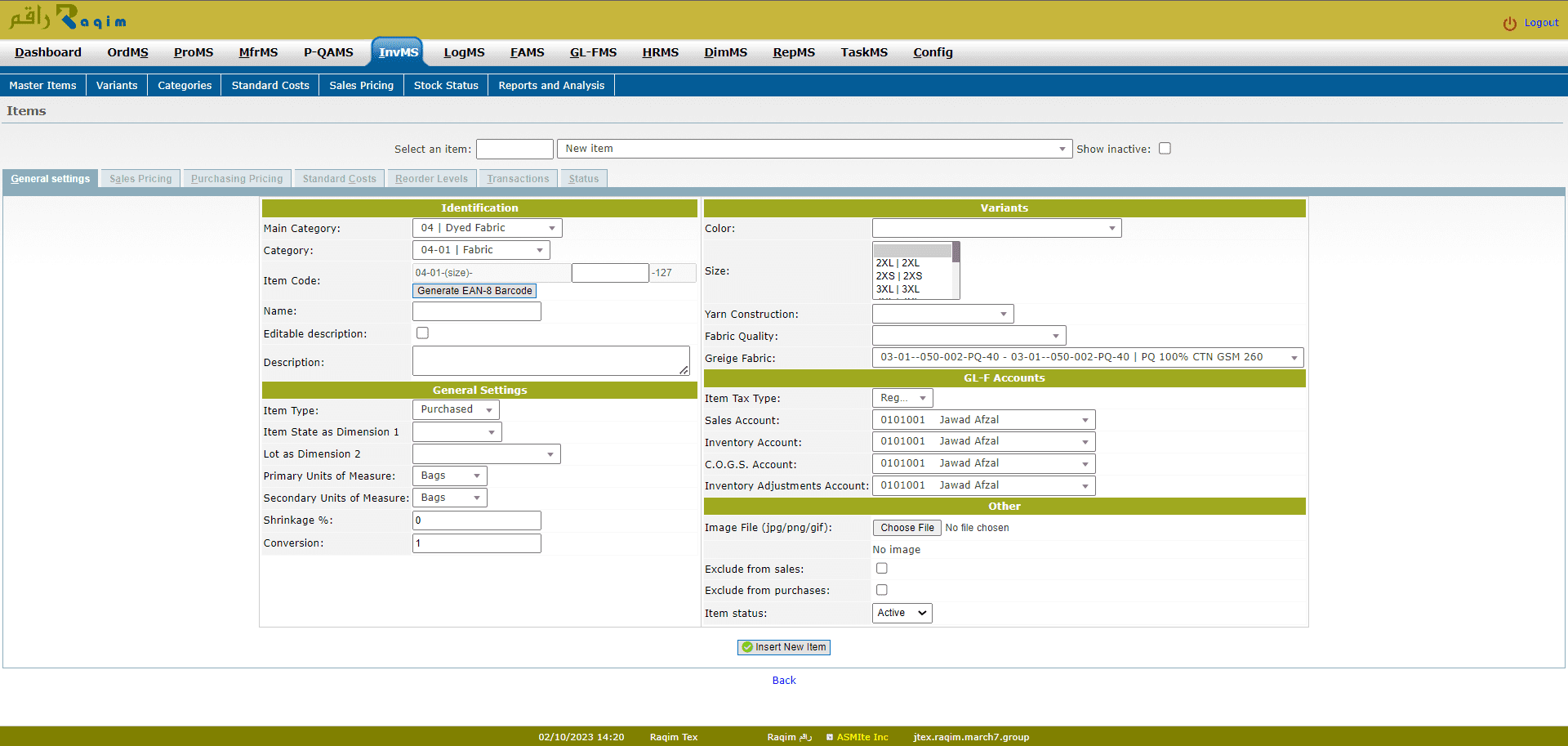
Exclusive Settings of Dyed Fabric
- General Settings
Shrinkage%: It is the percentage of the Fabric which will be Shrunk during Dyeing Process.
Conversion: It is the conversion rate from Primary to secondary unit.
- Variants
Color: It is the color of the Dyed Fabric
Size: It is the Size of the Fabric
Yarn Construction: It is the Construction mixture of Yarn of the respective Dyed Fabric.
Fabric Quality: It is the Quality of the Fabric i.e. GSM ratio.
Greige Fabric: It is the Greige Fabric used to manufacture the required Dyed fabric.
05 | Stitching Accessories/06 | Packing Accessories
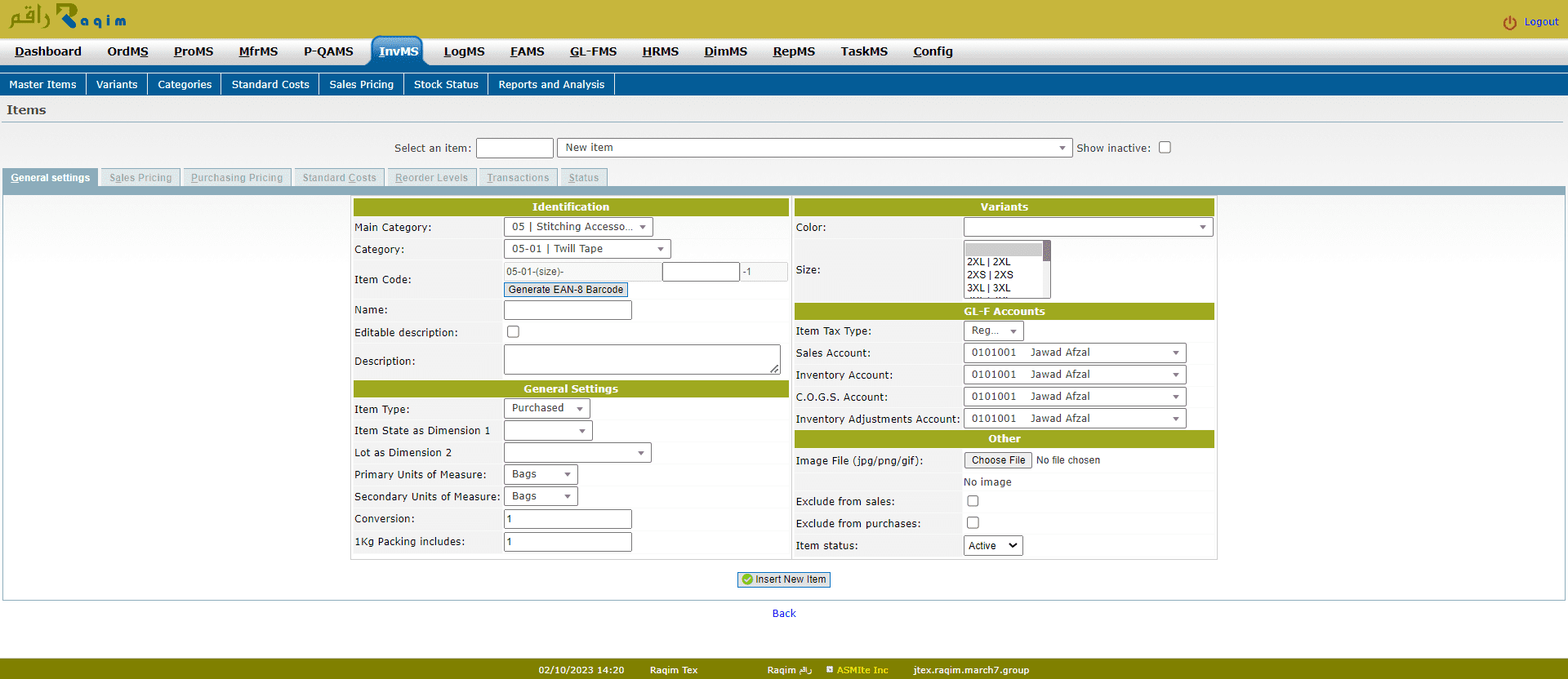
Exclusive Settings of Accessories
- General Settings
Conversion: It is the conversion rate from primary to Secondary unit.
1kg Packing includes: It is the quantity of Accessories used in 1kg of packing.
- Variants
Color: It is the color of the item.
Size: It is the size of the item.
07 | Finished Goods
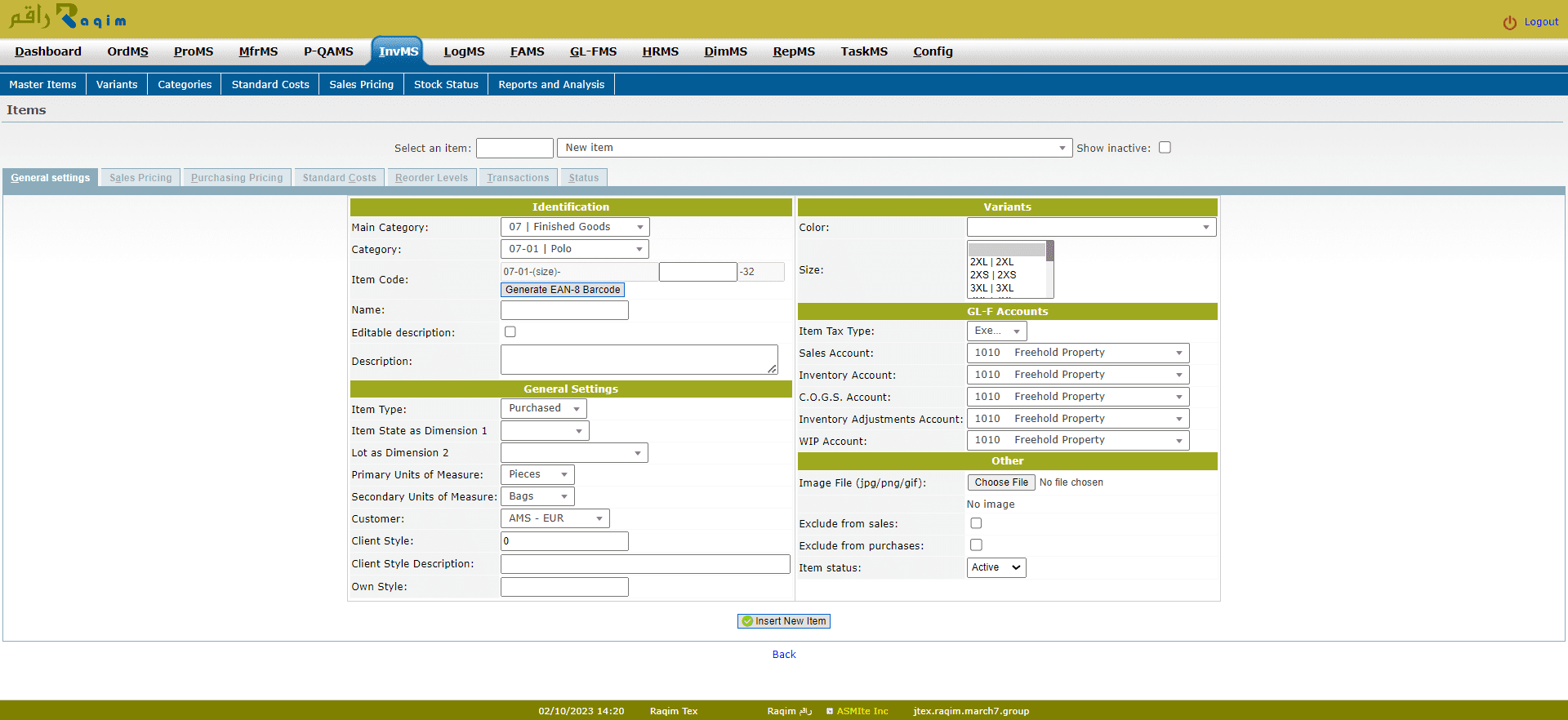
Exclusive Settings of Accessories
- General Settings
Client Style ID: It is the style code of a certain article which can have multiple items of the same style. It is the code which the client has associated to the product.
Client Style Description: It is the detail of the style code.
Style ID: It is the style code of a certain article which the manufacturer has given to it. It can be the same as Client style ID or maybe different.
- Variants
Color: It is the color of the Product.
Size: It is the size of the product.
Rest of the Tabs
- Sales Pricing
- Purchasing Pricing
- Standard Costs
- Reorder Levels
- Transactions It provides all transaction details of the item i.e. Item Movements, Inventory Adjustments and Inventory Location Transfers etc.
- Status

Tips and Tricks
Items are the things you buy and sell in your business. Items are associated with an Item Type which can be one of three values: Manufactured, Purchased or Service. If you nominate an item type as 'Manufactured' or 'Purchased' you can manage stock control and inventory through the Manufacturing menu. 'Service' items are not inventory controlled. Items are also associated with an Item Category (which you can define).
Many Items?
If you have many records you can enable Search Item List in Company setup. You can then start a search by pressing a space in the Item List, or use the edit box in front of the list if such one is available. Now enter fragment of an Item id, category or description and press tab. The list will now be populated with relevant records. If you enter a *, all records will be shown.
Edit Description from Suppliers Page
When creating an item, there is a checkbox that allows one to edit the description of the item. This works fine in Customer Invoicing, but does not work in Suppliers. To do so, if you first click on Add Item, and then click edit the line it works alright
The rules as per design intentions for Supplier Description are:
- The local Item description is shown on the local Purchase Order Line. When printing the Purchase Order the domestic description and exchange conversions is shown from the Suppliers purchase data on the Purchase Order.
- The reason for doing this on the local Purchase Order is that most users only knows our own item description.
- When receiving items for the Purchase Order, the Suppliers item description is shown. If the Supplier has changed his description then you can override it here and the Supplier Purchase Data is updated.
Service Items Not Posting to the Proper Expense Account
For items that have an item type of "service," enter an expense account in the "C.O.G.S. Account" field. This is where purchases of the item will be posted to.
NOTE: When setting up suppliers, make sure that you set the supplier's default "Purchase Account" field to "Use C.O.G.S./Inventory Account" or purchase transactions of service items will post to the wrong account.